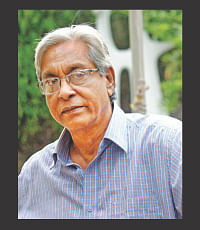Chashi Nazrul passes away

Socially and historically oriented films, which received a solid boost in post-independence Bangladesh, constitute the most glorious chapter in our film history. They aptly captured the aspirations of a nation, guiding us through dark times that persisted even after the independence.
With the demise of Chashi Nazrul Islam, known for his iconic film Ora Egaro Jon (1972), the country lost one of its most prominent directors who helped build that glorious chapter of our film.
Although it was his directorial debut, Ora Egaro Jon, also the very first film on the country's Liberation War, was a true epic that left an indelible mark on the fabric of Bangladeshi cinema.
Islam, a valiant freedom fighter, passed away yesterday at 5:51 am in the capital's LabAid hospital at the age of 73. He had been suffering from cancer for a long time, and was on life support for about 20 hours before he breathed his last.
His first namaz-e-janaza was held at the Eden Mosque at Kamalapur. His body will be taken today to the FDC and from there to the Press Club, following which his janaza will be held at the Baitul Muqarram National Mosque. He will be laid to rest at his village home in Bikrampur later in the day.
Born in Bikrampur on October 11, 1941, Islam split his school days between Bikrampur and India's Jamshedpur, where his father was posted in pre-partition India. He began working with Fateh Lohani as an assistant director in the film Asiya (1961), and later worked with Obaid-ul-Haq in Dui Diganta (1963).
After Ora Egaro Jon for which he won the National Award for Best Film, Islam never had to look back. On one hand he continued to make powerful films based on the Liberation War – Sangram, Hangor Nodi Grenade (for which he won the National Award for Best Director, 1997), Kamalpurer Juddho and Megher Pore Megh; he brought literary classics to life on celluloid on the other. The most notable of the latter came in 1982 when he made into film Sharatchandra Chattopadhyay's most popular novel Devdas, with Bulbul Ahmed playing the titular role and Kabori Sarwar and Anwara portraying Parbati and Chandramukhi respectively. He later re-made the film in colour in 2013.
His affiliation with Sharatchandra extended to Shubhoda (winner of the National Award for Best Director, 1986), while he also made films based on Rabindranath Tagore's works – Subha (based on the short story "Subhasini") and Shasti. Hangor Nodi Grenade and Megher Pore Megh are also adapted from novels by Selina Hossain and Rabeya Khatun.
Behula Lakhindor, Danga Fasad, Padma Meghna Jamuna and Bashona are some of his other notable films.
Chashi Nazrul Islam received numerous awards and honours throughout his career, with the 2004 Ekushey Padak being the highlight. But what makes his career truly illustrious is the fact that the cast of his films took home a lot of awards.
At a time when Bangladeshi cinema is in dire need of inspiration, Chashi Nazrul Islam, albeit through his exit, reminds us that artistically perfect films can also be commercially successful. His Liberation War films and the classics that he has immortalised on celluloid will always serve as a perennial source of inspiration and guidance for future generations of filmmakers and producers.

 For all latest news, follow The Daily Star's Google News channel.
For all latest news, follow The Daily Star's Google News channel. 



Comments